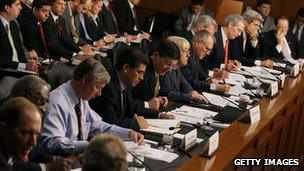US deficit: Super-committee talks 'at difficult point'
- Published

The committee is assessing a number of options dear to both parties
Talks designed to cut the US deficit have reached a "difficult point", but a deal is still possible, say members of a special super-committee.
With a deadline of 23 November fast approaching, Republican Patrick Toomey told Fox News, "the clock is running out, but it hasn't run out yet".
Democrat James Clyburn said he was hopeful a deal could be struck.
The committee has to find $1.5tn (£930bn) in savings over 10 years. But members are split on party lines.
Republicans are reluctant to concede tax rises unless Democrats agree to reduce social entitlements, correspondents say.
President Barack Obama plans to cut the US deficit by more than $3tn (£1.9tn) in the next decade.
His proposals - unveiled in September - include an overhaul of the tax code that would raise $1.5tn.
They also form part of the work of the congressional super-committee, which is not obliged to accept the president's ideas.
Faced with an election next year, Mr Obama has had a battle in Congress over how to reduce the ballooning deficit while the economy remains stagnant.
Closing gap
"We still have time, but we have no time to waste," Republican Senator Patrick Toomey said on Fox News on Sunday.
"It's at a difficult point. I think we've got a ways to go, but I hope we can close that gap very quickly," he said.
House of Representatives Democrat James Clyburn told Fox News: "I am not as certain as I was 10 days ago, but I think that we can."
The US owes more than $14tn in debt and runs an annual budget deficit of more than $1.4tn.
The bipastisan super-committee was set up in August. Its plan is to be submitted to both houses of Congress for an up-or-down vote by the end of the year.
If the committee fails to issue a recommendation, a series of painful spending cuts will automatically occur, split evenly between defence and domestic programmes dear to Republicans and Democrats, respectively. Those automatic cuts are described as an enforcement mechanism to encourage bipartisan co-operation.
Polling has indicated most Americans see a mix of tax increases on the wealthy accompanied by some spending cuts as the best way to trim the US budget deficit.
- Published10 August 2011
- Published9 September 2011
- Published12 September 2011
- Published3 August 2011
- Published31 August 2011